
Dubai: People unfit to drive due to their medical conditions may have their driving licences revoked, according to a senior Roads and Transport Authority (RTA) official.
The comment comes following a recent accident that was caused by a driver suffering from an epileptic seizure, leading to the death of two people and injuries to five others.
Currently, it is mandatory for professional drivers to pass an annual medical test to qualify for their jobs. Three phases of the project have been implemented, covering, bus, lorry and taxi drivers. The fourth phase, covering personal chauffeurs, is currently under implementation.
People with health conditions such as epilepsy, hypertension, cardiac ailments and certain extreme cases of diabetes, dementia and those with psychiatric disorders are not allowed to work as drivers in Dubai.
However, there are no such restrictions for regular motorists, but that might change soon.
Ahmad Hashim Behroozian, CEO of RTA’s Licensing Agency, told Gulf News that his agency is authorised to introduce restrictions.
“For the lay people, we are authorised to revoke a driving licence should we find a medical condition making the person unfit to drive,” said Behroozian.
What is holding RTA from implementing the policy is the fact that there are no means to find out the health conditions of individual drivers.
“At the moment, we do not have the means of finding out medical conditions that would make normal people unfit for driving. We are working with the federal government and the Dubai Health Authority to study the introduction of legislations that will make it easier for us to obtain information [regarding] medical conditions of private motorists,” he added.
In several developed countries, it is mandatory for drivers to declare their medical condition and according to Robert A. Hodges, chief operating officer at Emirates Driving Institute, it should be the case in the UAE as well.
“The UAE is somewhat behind Western standards in requiring potential drivers with psychological/mental problems to sign official ‘declarations’ and provide medical evidence, frequency of symptoms and severity. In the West, it is a criminal offence to withhold such knowledge from the government licencing authorities, and strict fines and punishments are enforced for those who don’t disclose the truth,” he said.
He added that a person with epilepsy should not really be in control of a vehicle unless the illness has been controlled, with no seizures for a long period of time.
Currently, the only physical check required for applicants of driving licence in the UAE is the eye test.
Also, there is a formalised process for evaluation for a special needs individual.
On health permits for professional drivers, Hodges added: “Professional drivers have to be at the highest safety and health standards due to the fact that these drivers are handling many passengers, or heavy loads. Thus, if they have, for example, an epileptic seizure, it would cause great harm to others.”










